Don't miss our holiday offer - up to 50% OFF!
Caboxib 80 mg (Cabozantinib)
Cabozantinib 80 mg, containing the active substance Cabozantinib, is a targeted remedy drug employed in the operation of certain advanced cancers. It’s a tyrosine kinase asset (TKI) and works by blocking colorful signaling pathways that lead to excrescence growth, angiogenesis (conformation of new blood vessels), and metastasis. By blocking these pathways, Cabozantinib 80 mg slows down cancer growth and improves patient issues.
Cabozantinib has been used relatively astronomically in the practice of oncology in cancers similar as advanced renal cell melanoma (RCC), hepatocellular melanoma (HCC), and medullary thyroid melanoma (MTC). Caboxib 80 mg is generally reserved for those cases taking tablets of lesser strength, generally grown-ups with advanced or metastatic complaint.
Composition and Form
Brand name Caboxib
general name Cabozantinib
Strength 80 mg
Formulation Film- carpeted oral tablet
Pharmacological class Tyrosine kinase asset (TKI)
Mechanism of Action
As a multi-kinase asset, cabotinib inhibits a number of tyrosine kinases that are critical for the survival of cancer cells and the development of excrescences. It works against the following receptors:
VEGFR (Vascular Endothelial Growth Factor Receptor) Involved in the development of blood vessels that supply excrescences with oxygen and nutrients.
MET (Hepatocyte Growth Factor Receptor) Involved in the growth of cancer cells and metastasis.
AXL Associated with resistance to other cancer treatments and with aggressive excrescence geste.
By inhibiting these pathways, Caboxib 80 mg prevents excrescence vascularization, cancer cell growth, and metastasis to other corridor of the body.
Indications (Uses)
Caboxib 80 mg is used in the treatment of cancers, including
Renal Cell Melanoma (RCC)
In circumstances of intermediate or low threat, as a first-line or alternative treatment for advanced order cancer.
Hepatocellular Carcinoma (HCC)
In cases with liver cancer who have preliminarily entered sorafenib.
Medullary Thyroid Melanoma (MTC)
recommended in situations where the problem is progressive, incurable, locally progressed, or metastatic.
Other Investigational Uses
Cabozantinib is being delved in clinical trials for its exertion in other cancers, similar as prostate cancer, lung cancer, and ovarian cancer.
Dosage and Administration
Usual Adult Dose Cabozantinib is generally started at 60 mg once a day, but the 80 mg strength may be employed depending on patient forbearance, response to remedy, or as directed by the oncologist.
Administration
Once- diurnal oral administration.
To be taken whole with water.
at least one hour before or two hours after eating, on an empty stomach.
Cure must be personalized depending on tolerability, adverse responses, or medicine relations with attendant agents.
Important Cases must nearly follow their oncologist’s orders, since indecorous operation can reduce efficacity or increase toxin.
Side Effects
Like all cancer medicines, Caboxib 80 mg can beget side effects. They vary according to individual forbearance and length of treatment.
Common Side Effects
Diarrhea
Fatigue or weakness
Loss of appetite
Weight loss
High blood pressure (hypertension)
Nausea and puking
Mouth blisters (stomatitis)
Hand- bottom pattern (greenishness, swelling, pain in triumphs and soles)
Severe Side Effects
Hemorrhage (severe bleeding)
Gastrointestinal perforation (rare but serious)
Blood clots (deep tone thrombosis, pulmonary embolism)
Crack mending complications
Liver dysfunction
Severe hypertension
Osteonecrosis of the jaw (rare, especially in cases with previous bisphosphonate exposure)
Cases passing severe or patient side effects should see a doctor incontinently.
Precautions and Warnings
Gestation and Lactation
Not recommended during gestation as it can beget detriment to the future child.
Breastfeeding isn’t recommended during Cabozantinib treatment and for at least 4 months after the last dose.
Wound Healing
Cabozantinib may impact crack mending. Treatment should be halted before surgery and only renewed after full recovery.
Medicine relations
Avoid concurrent use with strong CYP3A4 impediments or corrupters since they alter medicine situations.
Avoid grapefruit juice since it increases situations of Cabozantinib in the body.
Pre-existing Conditions
Individuals with cardiovascular complaint, gastrointestinal complaint, or liver impairment should use Caboxib 80 mg with caution.
Storage Instructions
Store at room temperature (15 °C to 30 °C).
Avoid heat, humidity, and direct sun.
Store in original packaging to cover from light.
Out of reach of children.
Benefits of Caboxib 80 mg
Proven exertion in decelerating cancer growth and perfecting survival in advanced cancers.
Inhibits multiple signaling pathways, offering further comprehensiveanti-tumor effect.
Convenience of oral dosing compared to intravenous cancer curatives.
Standard of care established in advanced RCC, HCC, and MTC.
Limitations
Not a cure; it helps manage and control cancer progression.
May beget significant side effects taking close monitoring.
Depending on the excrescence kind, stage, and individual response, effectiveness varies from case to case.
Conclusion
Caboxib 80 mg (Cabozantinib) is a veritably potent treatment for individualities with certain advanced cancers, including renal cell melanoma, hepatocellular melanoma, and medullary thyroid melanoma. By inhibiting a number of tyrosine kinases, it effectively slows excrescence growth, angiogenesis, and metastasis. While its benefit is great, the eventuality for side effects requires careful case selection, watchful monitoring, and close case- healthcare provider communication.
For the cases battling end- stage cancer, Caboxib 80 mg offers a lifeline in the form of enhanced survival and quality of life under rigorous medical care.


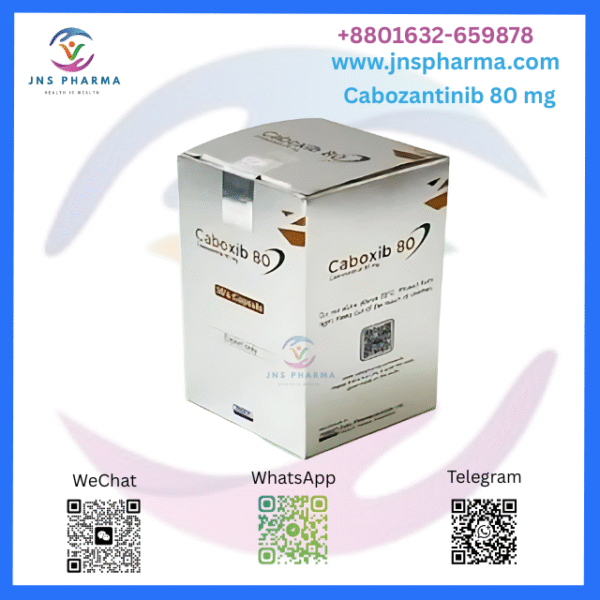
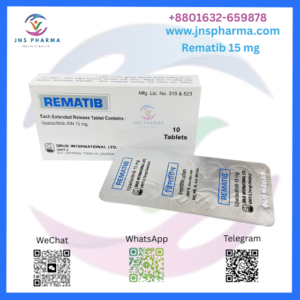
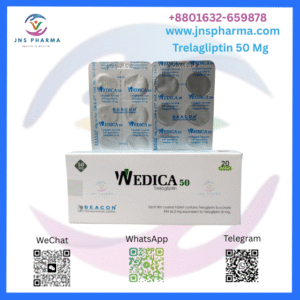
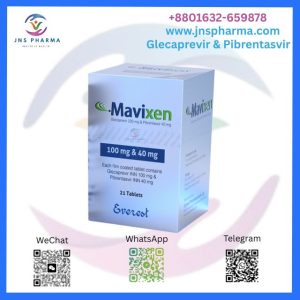
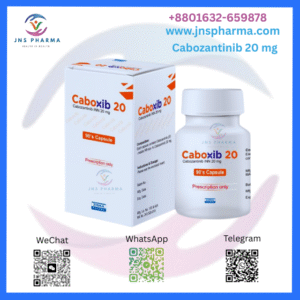
Reviews
There are no reviews yet.